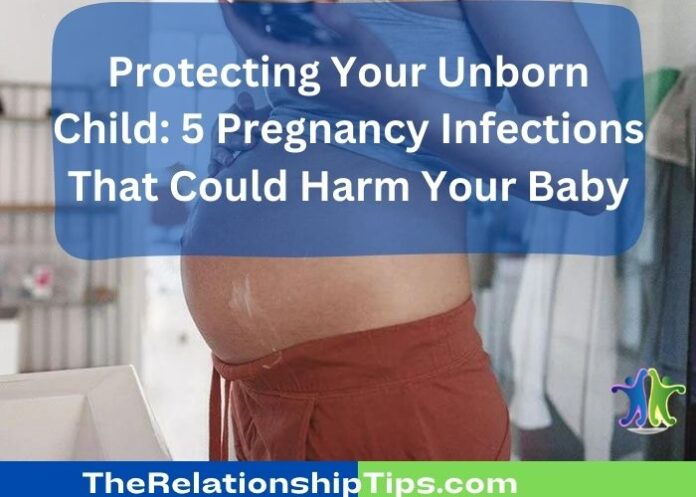As a mom-to-be, you want to do everything possible to ensure your baby’s health. While a healthy diet, exercise, and regular check-ups are important, you also need to be aware of potential infections that could harm your baby. Here are five pregnancy infections that you should know about and take steps to prevent.
In This Article
- 0.1 1. Group B Streptococcus (GBS)
- 0.2 2. Cytomegalovirus (CMV)
- 0.3 3. Toxoplasmosis
- 0.4 4. Syphilis
- 0.5 5. Zika virus
- 0.6 Frequently Asked Questions
- 1 What are pregnancy infections that could affect the baby?
- 2 How do these infections occur during pregnancy?
- 3 What are the symptoms of these infections in babies?
- 4 How can these infections be prevented during pregnancy?
- 5 How are these infections diagnosed in babies?
- 6 What are the treatment options for these infections in babies?
- 7 How can mothers protect their babies from these infections after birth?
- 8 Can these infections be cured completely?
- 9 What is the role of healthcare providers in preventing and treating these infections?
- 10 What resources are available for pregnant women to learn more about these infections?
1. Group B Streptococcus (GBS)
This bacterial infection is common among pregnant women and can be passed on to the baby during delivery. GBS can cause serious health problems, including sepsis and meningitis. However, GBS can be treated with antibiotics during labor and delivery, reducing the risk of transmission to your baby. Here is the steps to prevent GBS during pregnancy.
2. Cytomegalovirus (CMV)
CMV is a common virus that can cause hearing and vision problems, as well as developmental delays in babies. Pregnant women can contract CMV through contact with bodily fluids, such as urine and saliva, from infected individuals. To reduce the risk of contracting CMV, wash your hands regularly, avoid sharing food and drinks, and avoid contact with young children who may be carriers.
3. Toxoplasmosis
This infection is caused by a parasite that can be found in raw or undercooked meat, contaminated soil, and cat feces. Toxoplasmosis can lead to serious health problems, including blindness, deafness, and intellectual disabilities. Pregnant women can reduce the risk of toxoplasmosis by thoroughly cooking meat, washing their hands after handling raw meat or soil, and avoiding contact with cat litter boxes.
4. Syphilis
Syphilis is a sexually transmitted infection that can cause serious health problems in babies, including stillbirth and developmental delays. Pregnant women can be screened for syphilis during prenatal care and treated with antibiotics if necessary.
5. Zika virus
Zika is a virus transmitted by mosquitoes that can cause severe birth defects, including microcephaly, a condition where the baby’s head is smaller than normal. Pregnant women should avoid traveling to areas with a high risk of Zika transmission and take steps to prevent mosquito bites.
Conclusion
Being pregnant can be an exciting and overwhelming time, but it’s important to be aware of potential infections that could harm your baby. By taking steps to prevent these infections, such as practicing good hygiene and avoiding risky behaviors, you can help protect your unborn child’s health. If you have any concerns about your pregnancy or potential infections, talk to your healthcare provider for more information and guidance.
Frequently Asked Questions
What are pregnancy infections that could affect the baby?
There are several types of infections that can occur during pregnancy, including cytomegalovirus, group B streptococcus, toxoplasmosis, syphilis, and Zika virus, that can affect the baby.
How do these infections occur during pregnancy?
These infections can be transmitted from the mother to the baby during pregnancy or delivery.
What are the symptoms of these infections in babies?
The symptoms can vary depending on the type of infection but may include fever, rash, seizures, low birth weight, respiratory problems, and developmental delays.
How can these infections be prevented during pregnancy?
Prevention methods include getting vaccinated before pregnancy, practicing good hygiene, avoiding contact with people who are sick, and avoiding certain foods.
How are these infections diagnosed in babies?
Diagnosis may involve testing of blood, urine, or other bodily fluids to detect the presence of the infection.
What are the treatment options for these infections in babies?
Treatment may involve medications, such as antiviral drugs, antibiotics, or antimalarial drugs, depending on the type of infection.
How can mothers protect their babies from these infections after birth?
Mothers can breastfeed their babies to pass on antibodies and help protect them from infections. They should also continue to practice good hygiene and avoid contact with sick people.
Can these infections be cured completely?
In some cases, these infections can be cured completely with prompt and effective treatment. However, some infections may cause long-term complications or disabilities in babies.
What is the role of healthcare providers in preventing and treating these infections?
Healthcare providers play a crucial role in screening for and diagnosing these infections in pregnant women and providing appropriate treatment to prevent or minimize the risk to the baby.
What resources are available for pregnant women to learn more about these infections?
Pregnant women can talk to their healthcare provider, search reliable online resources, such as the Centers for Disease Control and Prevention (CDC) website, or join support groups to learn more about these infections and how to prevent them.





